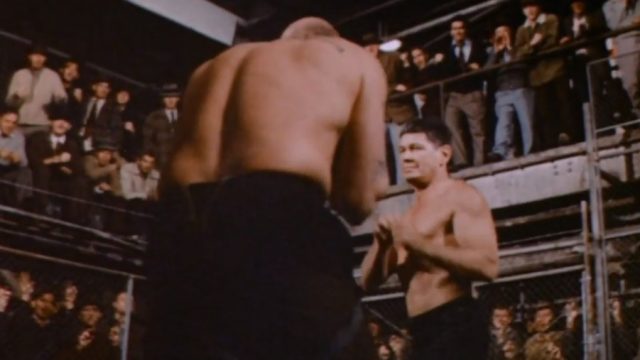The bare-knuckle boxing world of Depression-era New Orleans in Hard Times, where men meet in fields and warehouses and docksides to batter each other for money (and the audience gathers to gamble on the outcome), is not particularly bloody. Although the fighters play by rules that might not pass muster with the Marquess of Queensbury, they are still rules. But the fighting is brutal all the same, never more so in an early match for local champ Jim Henry He’s played by the giant golem Robert Tessier, whose massive shaved head can absorb a lot of punishment; what makes the end of this fight so grim is Henry using his own skull to bash his opponent’s. He swings it like a truncheon the size of a bowling ball, grinning as he does and feeling no pain. But it’s still his head doing the smashing, a man turning himself into a tool.
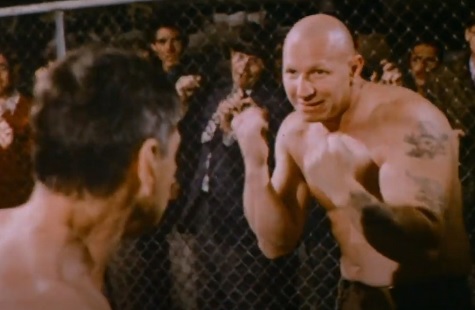
Walter Hill’s second movie, The Driver, is explicitly about a man who uses a machine to do a job and tries to be nothing more. But in some ways, the subject of his debut is even more stripped-down. Charles Bronson’s Chaney hops off a train and starts fighting under the banner of James Coburn’s Speed, a fast-talking promoter who uses sharp suits and a fancy car to project an image of success but can’t resist gambling his winnings away and getting in hock with the local mob and pissing off his longtime girlfriend. This is Speed’s existence: it’s easy to see that he’s been doing this hustle for a while and he sees it as the way to ultimately get nicer things, a better life, and respect, if not respectability.
It’s unclear, on the other hand, what Chaney wants out of life. He’s a great boxer and in excellent shape, but we never learn anything about the past that got him to that condition, or that left him nearly penniless when he convinces a skeptical Speed to take him on. While Speed flashes his cash, Chaney hoards his winnings, continuing to stay in a flophouse with his one small bag when he isn’t hooking up with Jill Ireland (the weakest part of the movie). Chaney does not need any possessions, certainly nothing like the Driver’s car, to make his living. His job, his life, is his fists. He acquires one new thing over the course of the movie, one thing he brings back home into his life: a cat.
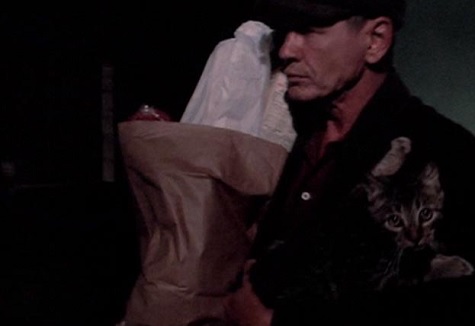
This is almost certainly a nod to the pet bird belonging to Jef Costello, the assassin of Jean-Paul Melville’s Le Samourai, in his own sparse living quarters. Hill was hugely influenced by that film and its existential depiction of a man doing a job. There’ a big difference between Chaney and Costello, though: Chaney is not a bitch. For all Costello’s cool, he is owned by the mob — he gets paid by doing jobs for them, on their schedule and at their command, and their betrayal of him is a foregone conclusion. Chaney puts up his own money when he fights and when Speed tries to lay out the basic arrangement for future bouts — 50/50 split of the main take, 80/20 of the side action in Speed’s favor — Chaney reworks that to 60/40 for him of the main and an even split of the side. This isn’t a demand so much as a statement, how it will be. Chaney does not own much, but he owns himself.
But he recognizes that he does need Speed. Speed has the connections with other people in this world, like dope-addicted doctor/cut man Poe (Strother Martin plays him as Tennessee-Williams louche, the cousin of Gilbert Dautrieve) and the heavy hitters who manage fighters that bring in big pots. And he has the hustle to deal with them, to whip up the odds and set up the matches. He’s the first mouthy partner in a dynamic Hill has noted runs through his movies, the counter to the stoic lead, the wiseass with the badass. The most obvious example of this is Eddie Murphy and Nick Nolte in 48 Hrs., although their power dynamic’s out of whack; the best-balanced pairing is probably Keith Carradine and Powers Boothe in Southern Comfort. Speed and Chaney are closer to the latter and have similar problems with Cajuns — Speed sets up a fight at a hillbilly gathering out in the back country and when Chaney wins, the opposing promoter refuses to pay up. His small army of friends forces Speed and Chaney to back away in disgrace, but they later stop by the head Cajun’s bar, where Chaney kicks the holy shit out of everyone and gets his money. And then he shoots up the place — not people, but things like the fancy chandelier and the awesome jukebox. Possessions and indicators of wealth that Speed would probably like to have in his own place one day, and for a guy with a stone face, Chaney’s clear in his contempt as he blows this stuff away. Yin and yang.
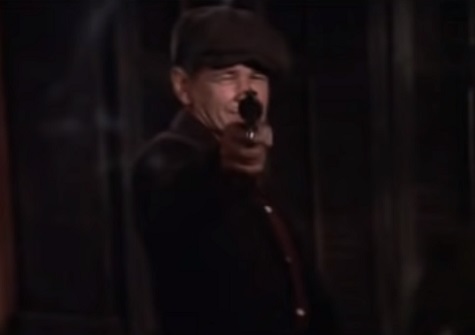
Hill performs his own balancing act throughout the movie. While the movie was made on the cheap, there are still plenty of nifty old cars and snazzy clothes and other well-observed production details, and the locations look great. I’m guessing a fair amount of New Orleans architecture was the same in 1935 as it was in 1975, but there are also plenty of different places within the movie — speakeasies and docksides, fancy spas and oyster shucking warehouses, seedy diners and that outdoor Cajun barbeque. There’s a lot for the camera to take in, but if Speed designed the movie, Chaney shot it — the camera generally stays back and avoids close-ups, the better to see the full fights on display, and its movements are smooth. Even a shot like a remarkable look down through several catwalks of men cheering on two fighters on the ground floor of an empty factory is linked to the perspective of those men, as opposed to a more ostentatious director/god’s eye-view. Hill has famously said that all his movies are Westerns and that’s felt here in the perspective and the pace, the cool knowledge that conflict is coming, and the unhurried depiction of a world of violence. Except here the violence is not to settle the frontier but part of a settled world, with a hierarchy very much set in place.
Hard overhead.jpg
And look who’s at the bottom
At the top is Jim Henry’s manager, a fishing magnate named Chick Gandhil (it’s unclear why he shares a not-exactly-common name with the ringleader of the Black Sox scandal, it’s definitely not the same guy). He’s a rich dick who changes the rules when he can, and when Chaney beats Henry, Gandhil turns the latter into his flunky without a thought, the mighty fighter now opening doors and holding coats. Gandhil owns that oyster warehouse, and Speed sneers at him at one point that he’ll always smell of fish. This is a weird insult coming from a guy who sleeps on a Murphy bed. What’s wrong with the smell of honest work? I think it lands because Gandhil does none of that work, he makes his money off it and lives the good life, but he’s not a better class of person — just a guy who owns a lot of fish. A person who does not work with people, the way Chaney and Speed begrudgingly work with each other, but lives off their work, who likes to own men and is infuriated by a man who beats up his property. And whose reaction to being balked is to try to buy satisfaction.
After Chaney beats up Henry and becomes the top fighter in town, Gandhil proposes buying an interest in Chaney. Speed would normally blow him off, but he’s in serious debt to those mobsters he borrows money from (he immediately gambled away his winnings); he tries to convince Chaney to agree and in doing so fractures the partnership: Chaney prepares to leave town rather than be owned. But Gandhil then buys Speed’s debt and puts the word out that Chaney needs to fight his new man or Speed will be killed. Gandhil has the power to force Chaney to play a role in Speed’s life or death, he can buy the fight he wants that way, and Chaney knows walking away wouldn’t prove his independence and would only get a guy he once treated as a partner put to death. But there are things even Gandhil can’t buy.
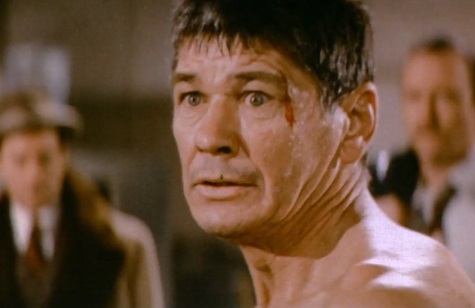
The fighter he’s brought in from Chicago, Street, is played by longtime stuntman Nick Dimitri and like Bronson’s, Dimitri’s body is muscular and tough without being jacked. They both look like men who have been in and won fights. They are very evenly matched, and while Dimitri is only fighting for the paycheck, he is a professional, not holding back but also not holding any animosity toward Chaney (and Chaney feels the same, Street is just another guy being paid to fight). It’s a rough match, but Chaney finally knocks Street down and gains the upper hand and a furious Gandhil, seeing yet another one of his fighters about to fail, rolls a pair of lead cylinders across the floor and yells at Street to pick them up. They’re the size of rolls of quarters, as objects they’re a lot less complicated than the Driver’s car or the guns carried by Hill’s other protagonists. But they are still tools, items that add to and yet dehumanize the men wielding them. They help make men into tools themselves, things that a guy like Gandhil will break if it suits him. Speeds a blustery jerk but not a craven one and demands the match be stopped and even Chaney looks disturbed — Bronson widening his eyes is just as emotive as Coburn shouting. But Street knocks the cylinders away, getting up to get knocked down for good and lose fair and square. He and Chaney share a look of respect and Chaney takes his former partners and leaves, hopping another train out of the city with his winnings and the clothes on his back. He does give some money to Speed and Poe as he goes, telling them to take care of the cat.
Gandhil doesn’t get what he wants, and he doesn’t get hurt either. It’s easy (and honestly satisfying) to imagine a version of the movie where Bronson righteously punches him in the nose, a climax that reverses the power dynamic against an oppressor. But it’s not like punching people like Gandhil will change their view of people as objects to use and manipulate — upgrade with a blunt instrument here, downgrade to a coat-holding lackey there. Street’s refusal to buy into this creates something intangible that Gandhil can’t grasp, an agreement to behave with honor toward each other. To be men and not tools. That may not make everyone a profit, but in hard times, it’s still worth something.

